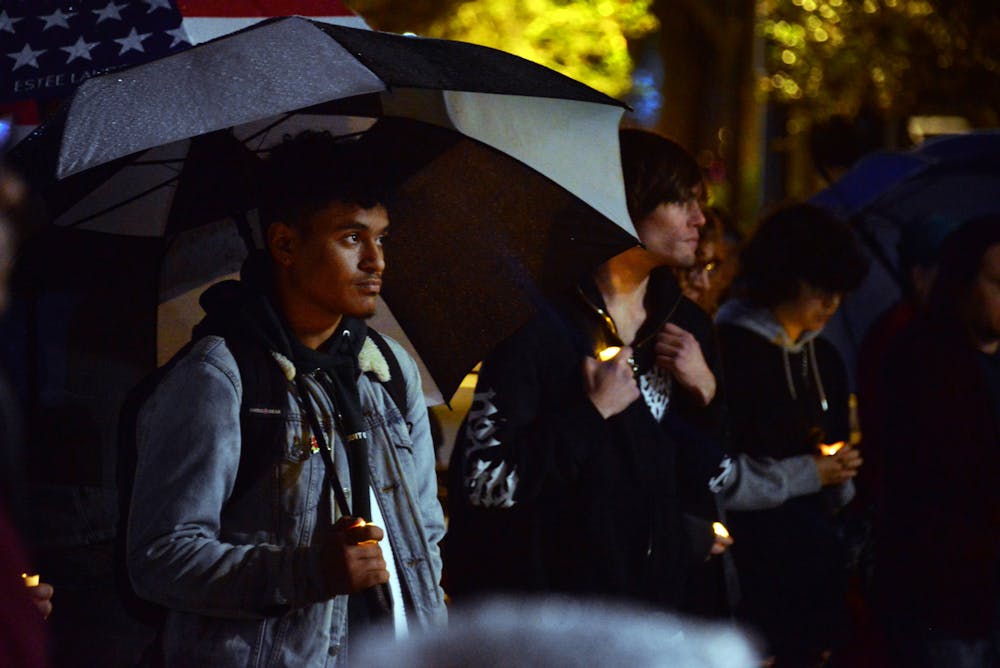Sofia Clementina Noriega. Matthew Angelo Spampinato. Za’niyah Williams. Ke’Yahonna Stone.
Those were just four of the chosen names in a list of more than 340 murdered transgender women named during a Gainesville event meant to commemorate Transgender Day of Rememberance, a vigil for those who have been impacted by transgender violence.
More than 60 members of the Gainesville community raised lit candles and umbrellas outside the steps of Gainesville City Hall in honor of the transgender lives lost to violence and hate Sunday evening. The list of names read out — which included transgender women who were murdered in the past two years — came from countries around the world including Brazil, France and the U.S.
This solemn night served as a reminder to many in the Gainesville community of the violence and hatred transgender people have experienced, organizer Kane Barr said.
“Our lives are important,” Barr said. “The deaths of transgender women — they need to be investigated just as equally; they're equally as important as anybody else's death.”
Barr, a 34-year-old Gainesville resident who identifies as a transgender man, said the event was started to raise public awareness of violence against transgender people, as well as to mourn and honor the lives of those who might have otherwise been forgotten.
The night before the event, five people were killed at a LGBTQ nightclub in Colorado Springs, Colorado. But that didn’t stop Cheryl Kaplan, a 70-year-old board member of Gainesville’s chapter of Parents, Families and Friends of Lesbians and Gays, from showing up in support of her daughter, who identifies as lesbian.
Kaplan believes the support of TDOR is needed now more than ever, she said.
“People called me and said, ‘Are we still on?’ And I said, ‘Absolutely. We're still on,’” Kaplan said. “This is so important. People need to know about the problems that transgender and LGBTQ+ folks have. We have to call attention to it.”
The first TDOR was held in 1999 in the Castro district of San Francisco to honor the memories of Rita Hester — a transgender woman of color — who was killed in November 1998, Barr said.
Nearly half of respondents were sexually assaulted at some point in their lifetime and one in 10 were sexually assaulted in the past year, according to almost 30,000 transgender individuals in a 2015 U.S. Transgender Survey. In communities of color, these numbers are higher: 53% of Black respondents were sexually assaulted in their lifetime and 13% were sexually assaulted in the last year.
The Human Rights Campaign tracked a record number of violent fatal incidents against transgender and gender non-conforming people in 2020. A total of 44 fatalities were tracked by HRC, marking 2020 as the most violent year on record since HRC began tracking those crimes in 2013.
There needs to be more investigation into the violence and deaths of transgender people, Barr said.
Regina Livingston, a 50-year-old Black transgender woman who spoke at the vigil, said she came to the event to show support to members of her community.
Livingston called for heightened advocacy and protection of people within the trans and LGBTQ community to prevent further death and violence. Government officials shouldn’t ignore acts of hatred against trans people, she said.
“This is the land of the free and the home of the brave,” Livingston said. “They should be in place to protect us. And they're not protecting us. That's why this is going on.”
Even in times of tragedy, Barr said celebration is also in need for the LGBTQ community. There’s a lot of good in the community, which shouldn’t be forgotten, he said.
“It is very important to be very mindful of these really horrible acts of violence towards the LGBTQ community,” Barr said. “We also have to balance between the harm that's being committed and the negativity in the community, but also the positivity that's occurring.”
Having more open conversions about shared experiences with transgender people to help break down social barriers and conflict is another necessary step, Barr said.
“It’s really important to focus on what we can do and what is within our power,” he said. “And so, in our power, we have the ability to have open conversations with our friends and family.”
“We're all human,” Barr said. “The Gainesville community, thankfully, is very, in general, you know, welcome and warm and friendly. There's always going to be someone who is coming from a place of fear. And we need to highlight more love than fear.”
Marzella Flowers, a 21-year-old Latina transgender woman who attended the vigil, said she came out to show her support as a woman of transgender experience.It’s particularly important to commemorate their lives with the chosen names of transgender people, rather than their names assigned at birth, to immortalize them as they’d liked to be remembered, Flowers said.
“It's important that the people who can stand and do stand alive at the end of the day, carry on the names of those who came before,” Flowers said. “Because without the names of those people, there will be no names in the future to carry on the legacy of this community.”
Flowers is grateful to live in a community where she can be proud of her trans identity, she said.
“Being directly in the queer community, loud in the queer community and public in the queer community is so openly accepted and celebrated in Gainesville,” Flowers said. “That is something that is fought to be protected so publicly by everyone — not just those who are affected by these policies — but the people around them who can genuinely empathize.”
Contact Malori at mmalone@alligator.org. Follow her on Twitter @malori_malone.






